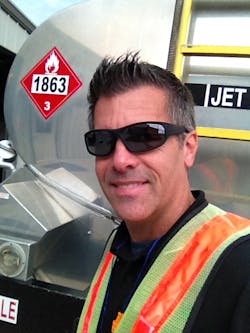Training New Line Service Technicians – Keep Them Safe While They Learn the Business

So often, airport fueling agent and fixed base operator (FBO) employers are working with skeleton line service crews to satisfy their customer’s needs, and only add personnel when absolutely necessary. This has become even more critical with the uncertainty of the aviation business environment today. Most times, once hired, that trainee receives minimal training at best and is forced to learn by shadowing an existing line service person. This training method may work to get the new employee to understand the basics, but may not provide a systematic understanding on, not only “how,” but “why” the tasks are performed the way they are.
There are so many areas a line service technician must understand about airport logistics, operations, aircraft, fuel and equipment. Providing the essential training becomes a “learn as you go” (in some cases), but most times is never really complete due to failure to document the training. The company’s “trainer” may only have tribal knowledge, or may have only received minimal training on how to perform their job properly themselves; more importantly, how to perform it safely. Often this may result in an accepted attitude of “this is the way we have always done it,” with no focus on whether or not the task was actually performed correctly and according to industry standard.
The Occupational Safety and Health Administration (OSHA) states in its general guidelines, that prior to an employer requiring an employee to perform a task, he or she must be trained in the proper performance of that task. It continues to say, the employer must ensure the employee is made aware of any hazards inherent with the job function and the use of proper personal protective equipment (PPE). This can be a challenge when the trainer does not have the understanding of the actual guidelines themselves.
Let’s face it, attempting to understand the complete OSHA general safety guidelines section and how it applies to your function within the company, is daunting at best. As the trainee, a person accepts the instruction his or her trainer provides; assumes it is correct and assumes it is how the industry says it should be done. This is not always the case; in fact (unfortunately) we see just the opposite entirely too often. Minimal training; incomplete training; and inaccurate training are regrettably the situations we see in the field.
Providing a wide range of basic understanding and awareness of those tasks the employee may encounter in an airport/fueling operation environment is a daunting task. Not everyone has the basic skills required to do that. Just because an employee is great at their critical role, we cannot assume he or she is a great trainer. Educating on those critical areas of safety and existing hazards necessary to place a new employee on the ramp is a huge responsibility. Many times, the company trainer may be selected simply by the amount of time he or she has been fueling aircraft, or the longest tenured person.
Creating a systemized training program for an operation may sound like a nuisance, but long term, will pay dividends when it comes to mishaps, incidents and accidents. Providing a basic understanding of introductory aviation fuel and fueling-related tasks is a must to set that new employee up for success, resulting in a company’s success. This allows the new person to be productive, safe and have the working knowledge needed to avoid injuries, incidents and accidents. Ensuring that employees are well-trained in the tasks they are expected to perform, is not only a must from an industry standard perspective, but from a human perspective. No one wants to see another person get injured due to a lack of training, or lack of situational awareness.
The Aviation Training Academy has developed an online training module called, “Line Technician in a Day.” This module identifies potential latent hazards raising awareness of new fuel handlers to make an informed approach to aviation fuel quality and personal safety. In approximately 4 to 6 hours the student will cover topics such as, General Aviation Industry Overview, Basic Customer Service, Airport Security and Emergency Response Procedures, Basic Safety Practices, Safe Airport Operations, Safety on the Ramp, Basic Marshaling, Aircraft and Fuel, Aviation Fuel Types and Characteristics, General Fueling (Basic), Basic Fire Training, Hazardous Materials, Fuel Spill and Remediation Safety, Refueling Vehicle Safety, Helicopter Safety and Ground Power Unit Safety.
Obviously, not all field situations can be predicted. However, providing accurate, succinct and timely training to acquaint the student with as many aspects of aviation fuel handling and personal safety as possible should be any company’s first area of importance. Information is king; if we know better, we do better.
David M. Ware's 30-year aviation industry career began as a logistics specialist with the 3rd largest oil company in the world. Today, Ware works with Aviation Training Academy to bring effective on-line training and on-site solutions for companies with ground operations at airports, including FBOs, corporate flight departments, flight schools, helicopter operators, MROs, into-plane services and airport operators. Ware's formal education includes a Bachelor of Science Degree in Business Administration from the University of Phoenix. He is also a frequent keynote speaker at the National Tank Truck Conference, Canadian Business Aircraft Association and the International Liquid Terminal Association conferences and National Air Transport Association Safety 1st Program.
Aviation Training Academy is dedicated to being a premier provider of aviation ground support, fuel handling and quality control training in the world. Its mission it is to elevate the standard for safety training in the aviation marketplace. ATA can be reached at 757-348-5862 or [email protected].
About the Author

David Ware
David M. Ware's 30-year aviation industry career began as a logistics specialist with the 3rd largest oil company in the world. After a company-wide downsizing took place, Ware moved over to a Petroleum Inspection company where he was the manager of a group of inspectors providing third party measurement services for all aspects of marine, pipeline and storage tank calculations.
Ware then went to work for a nationwide petroleum transportation carrier, which specialized in aviation fuels (Jet Fuel, JP8 and Av Gas 100 LL). Here he managed four terminals and over 100 drivers and dispatchers in Los Angeles and San Diego, California and Seattle and Bellingham, Washington.
Ware was then recruited to work for a large aviation fuel distribution supplier where he worked at a small refinery scheduling the feedstock in, and the finished products out, of the refinery/terminal. The company sold the refinery and Ware stayed on as the transportation manager, managing all aspects of a fleet of six trucks and their full utilization, scheduling and revenue development and fulfillment.
During his continued tenure, Ware supervised eight employees who managed the company’s field risks at each of their 400+ branded dealers and 120 Liquid Petroleum Terminals across the United States and Canada, as well as, their contracted road transport carriers. While here, Ware was also on the training team, as a lead trainer, providing Fuel Handling & Quality Training at on-site seminars throughout the United States and Canada.
Today, Ware has teamed up with two other aviation industry icons to create a company that is internationally recognized as the new standard in flight line training and training provider of choice, by bringing the most effective on-line training and on-site solutions for companies with ground operations at airports, including FBOs, corporate flight departments, flight schools, helicopter operators, MROs, into-plane services, airport operators. ATA has also expanded into the petroleum terminal operations that seek an understanding of API, EI and JIG standards, as well as CAF fire fighting equipment, which has added a revolutionary feather in the company’s cap.
Ware's formal education includes a Bachelor of Science Degree in Business Administration from the University of Phoenix. He is also a frequent keynote speaker at the National Tank Truck Conference, Canadian Business Aircraft Association and the International Liquid Terminal Association conferences and National Air Transport Association Safety 1st Program.